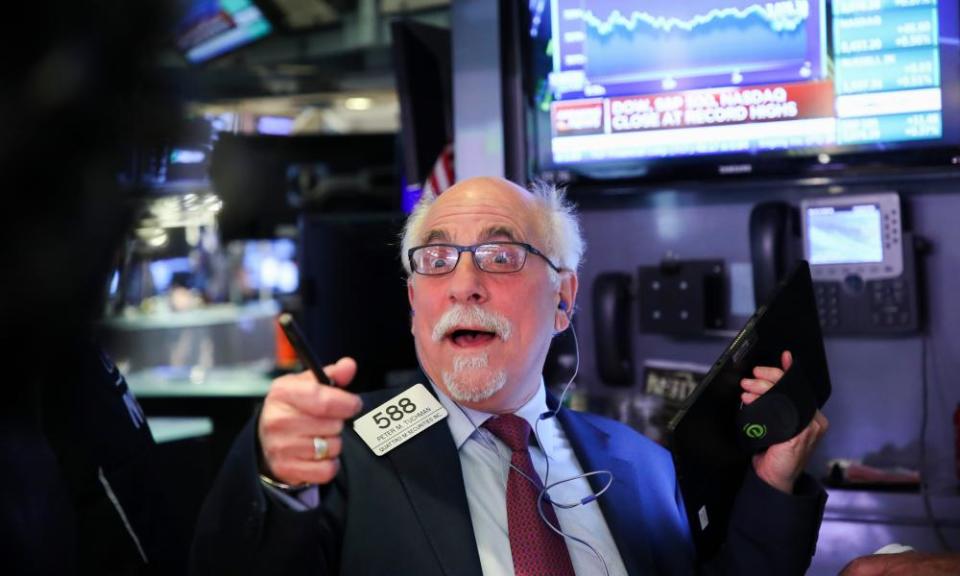Is this the worst time ever to invest?

Shares are shockingly expensive. Wall Street rose by 29% last year, as the market entered its longest-running “bull” phase in history. The biggest stocks, Apple, Microsoft, Amazon and Alphabet (Google) are together now worth $4tn (£3.1tn). Only 14 countries in the world have a GDP that is bigger than Apple’s market capitalisation alone.
Some stocks have seen gravity-defying increases. Tesla made just 365,000 cars last year, but at $85bn its market value is now more than Ford and General Motors combined – and they sell about 14 million cars a year.
The valuations on US equities are eye-watering. If you judge company share prices in relation to the profits they make, then only on two other occasions in history have Wall Street stocks been this high: 1929 and 1999. No prizes for knowing what happened next.
Related: Global stock markets post best year since financial crisis
Bonds are no better. The UK government is £1.8tn in debt. Yet it is able to borrow almost as much as it likes, at rock bottom rates. A government bond (gilt) that matures in 2071 is locked in at a coupon (interest rate) of 1.21%. If you buy it now, you are guaranteed to get just 1.21% a year for the next half century. Even in the Victorian era, when inflation was lower, gilts typically gave you about 3%-4% a year. As financial adviser, Jason Hollands of Tilney, says: “Those numbers are almost preposterous – at no point in financial history would that stack up.”
So shares are too pricey. Bonds are rubbish. What about the other major asset class, property? Well, how disappointing to see Halifax report this week that house prices surged in December to finish the year 4% higher than the start. The average UK house price is at an all-time high of £238,963. It’s (highly) unlikely prices will crash, but like shares in the US, if you are buying a house now, you are paying top dollar. We will have to return to the quaint idea of treating houses as homes, not investments.
If you think shares, bonds and property are just way over-priced, you can leave your money on deposit in a bank – and get 0.2% a year for a Lloyds Isa. That way you are guaranteed to see your money fall in value in real terms after inflation.
Meanwhile, economic growth is stubbornly low across most of the developed world. The UK economy may expand 1.5% this year, if we’re lucky (and Germany even less). Productivity is lousy, consumer confidence poor, and Brexit uncertainty hangs over everything.
Can I be a bit more cheery? Well, the UK stock market is now cheaper than at any time since the 1970s, if you compare it with other markets in developed countries. Of course, that could just be telling you that everything else is madly overpriced, rather than the fact that FTSE 100 is a good buy.
Sterling also remains deeply undervalued and over the longer term should appreciate – unless Boris Johnson engineers the worst of Brexit outcomes. We shouldn’t put it past him.
The good news? Donald Trump faces an election this year. We can probably safely rely on him juicing up the market in whatever way possible, so selling out much before 3 November could be a mistake. This side of the Atlantic, Boris will be pump-priming the economy as well, if the promised end to austerity and infrastructure projects actually materialise. Rightwing economists hate public spending, but stock markets (initially at least) tend to love it, as it turbo-charges corporate profits (think cement makers, construction companies, and so on).
In more than 30 years of financial reporting, one thing I’ve noticed is that when asset values look stupidly overpriced – like many do now – what happens next? They just get even more stupidly overpriced. I sense we’re in the giddy phase of the bull market, where prices keep defying gravity.
So despite the scary valuation figures, it probably isn’t the absolute worst of times to invest. I’ll stick my neck out and say the FTSE 100 will probably sail through the 8,000 level at some point this year.
The other truth about markets is that almost nobody gets timing right, and missing upturns is as risky as avoiding falls. The boring rules still apply – have a diversified spread of investments, hold for the long term, and avoid high charges eating your returns. And if you want a tilt at playing the markets, then maybe this is the year to buy British.

 Yahoo Finance
Yahoo Finance 